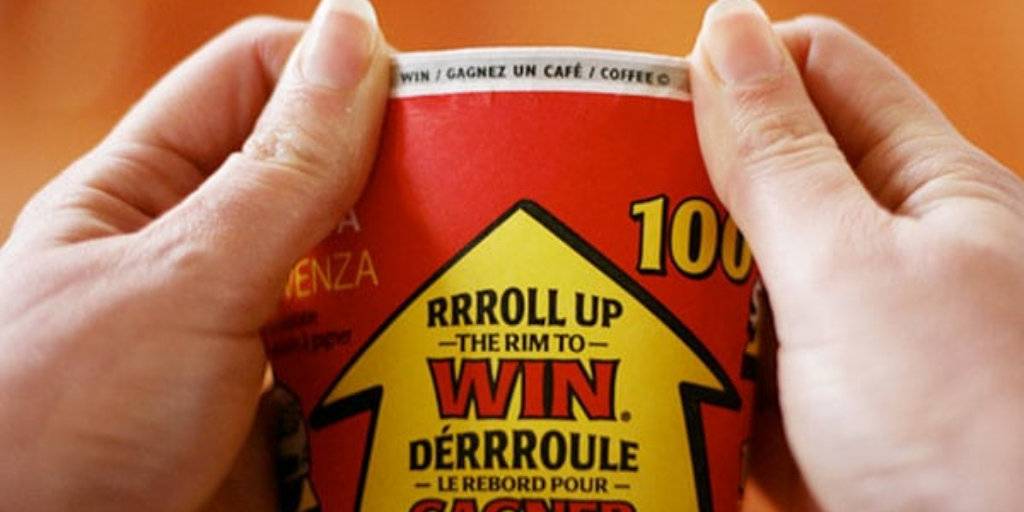

Photo: Troy Media MarketPlace
By Sylvain Charlebois, Professor in Food Distribution and Policy at Dalhousie University and Senior Director at the Institute of Agrifood Analytics at Dalhousie University
The entire “Roll up the Rim” campaign rests on the physicality of the cup itself. Almost 300 million cups are produced for the campaign, which usually ends in mid-April. Some winners have been required to send in the entire cup to claim their prize, instead of just ripping off the tab. But to redeem any prize, a cup is required, which is something tangible.
But packaging is on everyone’s mind these days. Hardly a day goes by without a story on plastics, garbage, or unsustainable practices in food retailing. In 1986, when Tim Horton’s Roll up the Rim campaign started, cities were still a few years away from launching recycling programs. Today, not only are food retailers and restaurant outlets under watch, Tim Horton’s has been targeted specifically as one the largest generators of garbage that ends up on Canadian seashores, alongside McDonald’s, PepsiCo, Coca Cola, and Nestle.


What is different now is how society values the concept of the circular economy. A company, any company, will remain responsible for the product it sells, from the initial transaction between the consumer and retailer to when all materials have eventually been repurposed, in one way or another. No waste, no pollution — only positive and desirable results, from a sustainable perspective. But even the slightest disregard for the environment will break the cycle of sustainability. Everyone cares about the environment, it seems, until life gets in the way. Time constraints, carelessness, laziness — many things can prevent proper disposal of products once they get into consumers’ hands. But gradually, companies are being held partially responsible for the garbage left in a parking lot, a stadium, on a beach or in a school yard. Times are changing. But the Roll Up The Rim To Win campaign is not.
A group of Calgary-based students, Mya Chau, Eve Helman and Ben Duthie, have amassed over 100,000 signatures to encourage Tim Horton’s to bring the entire campaign online. Another Albertan tried the same thing in 2016. Digitizing the promotion is being proposed by these groups so that customers can then bring in their own reusable cups to Tim’s, in order to reduce waste. A noble objective indeed. For Tim Horton’s though, such a shift would fundamentally change the nature of what the campaign is all about. There would no longer be conversations among friends or co-workers, with their cups of Tim’s coffee, waiting to see if anyone has won a car, cash, or simply another coffee. The campaign strategy worked and got many Canadians hooked. And sales at Tim Horton’s during the mid-winter months magically soared and customers kept coming back.
But it’s 2019, and the argument that increased profit justifies the means carries less weight than it did in 1986. It’s not just about increasing sales or getting customers on board. A promotional campaign is now, perhaps more than ever, about making people feel better. Buying countless paper cups with plastic lids isn’t acceptable anymore, especially for younger customers, specifically Generation Z and Millennials. That would be anyone under the age of 39, which accounts for more than 40% of the population. Demographic pressures are real. Not only does this age group value the environment, their economic clout is increasing. What’s more, they mostly see the internet, or apps, as a viable, easy alternative to any physical aspects of a marketing campaign. They believe that if the technology exists, why not use it? Some less tech-savvy customers may feel disenfranchised by a shift to an online campaign, but Tim Horton’s could risk losing more customers by sticking to past practices. Starbucks and other chains are making changes, so expectations are shifting rapidly.
Simply put, Canada’s love affair with Roll Up The Rim To Win needs to be modernized. It was nice while it lasted, but Canadians are expecting restaurant chains to embrace the circular economy, and that includes Tim Horton’s.


Dr. Sylvain Charlebois is Dean of the Faculty of Management at Dalhousie University in Halifax. Also at Dalhousie, he is Professor in food distribution and policy in the Faculty of Agriculture. His current research interest lies in the broad area of food distribution, security and safety, and has published four books and many peer-reviewed journal articles in several publications. His research has been featured in a number of newspapers, including The Economist, the New York Times, the Boston Globe, the Wall Street Journal, Foreign Affairs, the Globe & Mail, the National Post and the Toronto Star. Follow him on twitter @scharleb.










